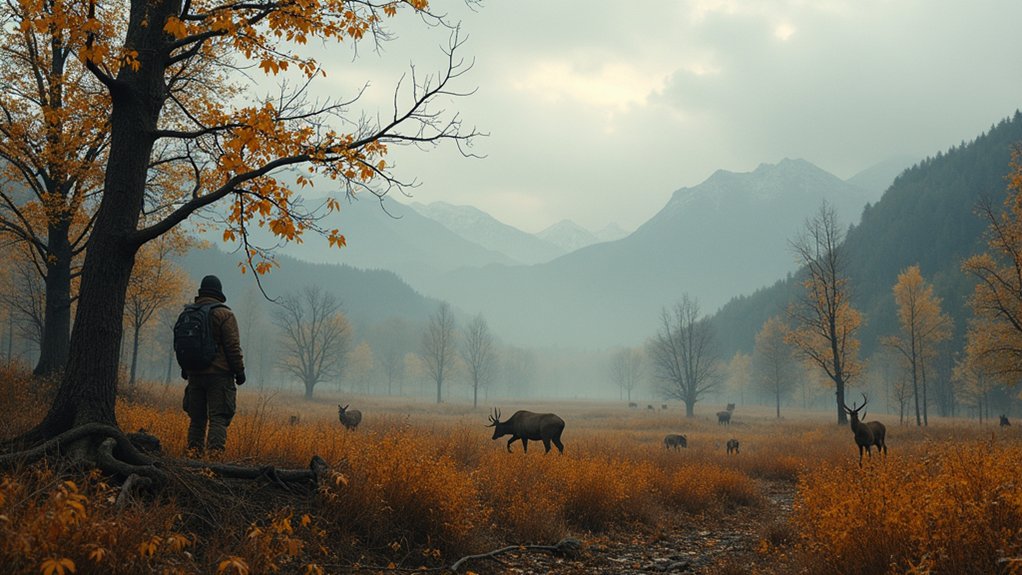As a hunter, you know the thrill of the chase, but have you considered how climate change is reshaping the landscapes you hunt? Shifting weather patterns and habitat changes are altering wildlife populations, which can impact your success in the field. Understanding this relationship is vital, not just for your sport, but for the conservation of ecosystems. What adjustments might you need to make to adapt and guarantee a sustainable future for both hunting and wildlife?
What is the Relationship Between Hunting and Climate Change?
While you might think of hunting as a separate issue from climate change, the two are deeply interconnected. Changes in climate can alter animal migration patterns, breeding seasons, and habitat availability, which directly impact hunting success.
In addition, hunters often contribute to conservation efforts, managing populations to keep ecosystems balanced. As climate change threatens habitats, these efforts become even more essential.
Moreover, hunting can influence land use, which may either exacerbate or mitigate climate impacts. Understanding this relationship helps you appreciate the role hunting plays in environmental stewardship and how your actions can support both wildlife and climate resilience.
How Does Climate Change Impact Wildlife Populations?
Climate change especially affects wildlife populations, altering their habitats and survival strategies. You might notice that animals are forced to migrate to find suitable living conditions as temperatures rise. This shift disrupts ecosystems and can lead to competition for resources.
Additionally, changing weather patterns can affect breeding cycles and food availability. As you observe these changes in your area, consider how they impact local wildlife. Species that can adapt may thrive, but those that can’t might face decline or extinction.
Understanding these dynamics helps you appreciate the fragility of ecosystems in a warming world and encourages conservation efforts.
What Are the Effects of Hunting on Ecosystems Amidst Climate Change?
As ecosystems struggle to adapt to the rapid changes brought on by climate change, hunting can further complicate their resilience.
You mightn’t realize that overhunting can lead to imbalances, disrupting predator-prey relationships and altering species distribution. This can result in overpopulation of certain species, which may harm vegetation and other wildlife.
Additionally, hunting can reduce genetic diversity, making populations less adaptable to environmental shifts. When combined with habitat loss and climate stressors, these effects can weaken ecosystem health, diminishing their ability to recover.
Understanding these impacts is essential for promoting sustainable hunting practices that support ecological stability.
How Can Hunters Adapt to Climate Change?
Adapting to the challenges posed by climate change requires you to be proactive and flexible in your hunting strategies.
Here are four ways you can adjust:
- Stay Informed: Keep up with climate data and wildlife patterns to understand shifts in animal behavior.
- Change Timing: Adjust your hunting schedules based on seasonal changes, as animals may migrate or breed earlier.
- Explore New Areas: Be open to hunting in different locations as habitats evolve and species relocate.
- Invest in Gear: Upgrade your equipment to handle varying weather conditions and guarantee comfort during longer hunts.
These adaptations will enhance your hunting success in a changing environment.
What Role Does Conservation Play in Mitigating Climate Change Effects on Hunting?
While you might think of hunting primarily as a personal pursuit, conservation efforts play an essential role in mitigating the effects of climate change on wildlife and their habitats.
By supporting initiatives that protect ecosystems, you help guarantee a stable environment for game populations. Healthy habitats are vital for the survival of species you hunt, as they provide food, shelter, and breeding grounds.
Engaging in responsible practices, like habitat restoration and sustainable land use, enhances biodiversity.
Ultimately, your involvement in conservation not only benefits wildlife but also preserves the hunting experience for future generations, making it a win-win for all.
Why Should Hunters Care About Climate Change?
Hunters should care about climate change because it directly impacts the ecosystems and wildlife they pursue. As temperatures rise and weather patterns shift, your hunting experiences can be drastically affected.
Consider these points:
- Habitat Loss: Changing climates can destroy or alter essential habitats for game animals.
- Species Migration: Wildlife may move to new areas, making traditional hunting spots less viable.
- Population Declines: Climate stressors can lead to reduced animal populations, impacting your harvest.
- Regulatory Changes: As ecosystems shift, hunting regulations may change, affecting your access and opportunities.
Your commitment to conservation can help combat these challenges.
How Does Climate Change Influence Hunting Seasons and Regulations?
Climate change is reshaping not just habitats and wildlife populations but also the hunting seasons and regulations that govern your activities.
As temperatures rise and weather patterns shift, animals may migrate earlier or later than expected, throwing off traditional hunting calendars. Wildlife agencies often adjust seasons to align with these changes, affecting when you can legally hunt.
Additionally, regulations may tighten in response to declining populations or new conservation efforts. Staying informed about these adjustments is essential for responsible hunting, ensuring you comply with the latest guidelines and continue to enjoy the sport sustainably amidst our changing environment.
What Are the Future Trends for Hunting in a Changing Climate?
As the impacts of a shifting climate become more pronounced, you can expect significant changes in hunting practices and strategies.
Here are some future trends to watch for:
- Migration Patterns: Wildlife will adapt, leading you to travel further to find game.
- Season Adjustments: Expect more flexible hunting seasons based on climate conditions rather than traditional dates.
- New Species: Warmer climates may introduce unfamiliar species to your hunting grounds.
- Sustainability Focus: You’ll see a shift towards more eco-friendly practices to preserve habitats and ecosystems.
Staying informed about these trends will enhance your hunting experience in a changing world.
